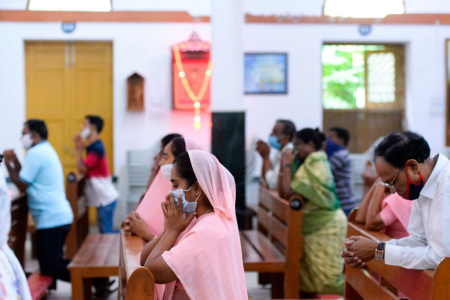Nearly 1 in 4 countries used force on religious groups violating COVID-19 worship restrictions: Pew

A new Pew Research Center analysis finds that nearly a quarter of 198 countries and territories analyzed used police and government force on religious groups who disobeyed COVID-19 worship restrictions.
The new analysis, published on Nov. 29 and included in its 13th annual report on restrictions on religion from 2020, shows how public health measures during the coronavirus pandemic impacted religious groups during the year it hit globally.
"In nearly a quarter of countries, governments used physical force, such as arrests and raids, to make religious groups comply with COVID-19 public health measures," the Pew study reads.
The report suggests that at least one type of force was used against religious groups in at least 46 countries or territories. The use of force resulted in "detentions" in at least 40 countries or territories, "physical assault" in 11, "property damage, confiscation or raids" in 10, "displacements" in four and "deaths" in three.
In Comoros, Gabon and Nepal, authorities used tear gas to disperse religious gatherings that violated lockdown orders.
The report cited the April 2020 arrest of 15 people attending a rabbi's funeral in New Jersey for violating the state's stay-at-home order, noting that the arrests "came after some mourners became disorderly and argumentative when police tried to turn the crowd away."
The report found that in 69 countries, one or more religious groups defied public health measures imposed during the pandemic, including the U.S. and Canada.
In Canada, several church leaders were arrested, jailed and fined for continuing to hold in-person worship restrictions. As The Christian Post reported, Louisiana Pastor Tony Spell faced criminal charges after holding services with over hundreds of attendees in violation of the governor's stay-at-home orders.
In other countries, there have been multiple incidents of Christian groups being targeted for failing to comply with COVID-19 safety measures.
In South Korea, authorities reportedly raided the headquarters of the Shincheonji Church of Jesus due to claims that the group violated restrictions on public gatherings and contributed to the spread of the virus. The group's leader allegedly refused to share membership lists with authorities to track the spread of the virus.
According to the U.S. State Department, two Christians died after being beaten in police custody following accusations of violating COVID-19 curfews in Tamil Nadu.
The Pew report also covers incidents in which private individuals or organizations have targeted different religious groups with accusations.
In addition to Jews and Muslims being targeted, Christian groups were also accused by private individuals and organizations in nine countries of spreading COVID-19.
"In Egypt, conspiracy theories blamed the pandemic on the Coptic Orthodox Christian minority, which international Christian observers said exacerbated the discrimination the minority group already faced," Pew reports.
Pandemic-related social hostilities against religious groups, which involved physical violence or vandalism by private individuals or organizations, occurred in four different countries: India, Argentina, Italy and the United States.
"In Turkey, an Armenian Orthodox church's door was set on fire, and news reports said the man told police that he acted because 'they [Armenian Christians] brought the coronavirus' to Turkey," the report reads.
"Meanwhile, the number of countries with either 'high' or 'very high' levels of government restrictions remained the same, at 57 countries (29%) from 2019 to 2020, a peak number for the study. At the same time, the number of countries with 'high' or 'very high' levels of social hostilities fell from 43 countries (22%) in 2019 to 40 countries (20%) in 2020, which was below the peak of 65 countries (33%) recorded in 2012."
Another Pew Research study from July 2022 reveals that compared to other countries, Americans remain mainly divided on whether there is a need for COVID-19 restrictions.
"About half of Americans (48%) say wearing masks around other people indoors has been extremely or very effective at limiting the spread of the coronavirus. A similar share (47%) say limiting activities and interactions with other people has been extremely or very effective," the July study states.
"Still, for both measures, roughly as many Americans describe these actions as no more than somewhat effective at limiting the spread of the coronavirus."
The July study reveals that Americans are less likely to see the coronavirus outbreak as a major threat to their personal health than at earlier stages of the outbreak, down from 30% in January 2022 to 23%.
Nicole Alcindor is a reporter for The Christian Post. She can be reached at: nicole.alcindor@christianpost.com.





















